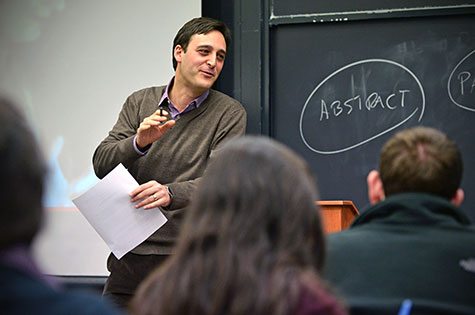
Translation is never a neutral act.
In “World-Wide Translation: Language, Culture, Technology,” Ignacio Infante, PhD, helps students critically examine the historical, cultural and ethical use of translation, as well as how new technologies and digital media are reshaping the field.
But Infante, assistant professor of comparative literature and of Spanish in Arts & Sciences, wanted to add a practical, community-based component. Last spring, with assistance from the Gephardt Institute for Public Service, he formed a partnership with the World Pediatric Project, a nonprofit organization that brings critically ill children from developing countries to St. Louis for medical treatment.
“Most of the kids are from Central and South America,” Infante said. Between waiting for, and recovering from, pediatric surgery, “they can be here for a week or up to three months.
“The role of our students is to design experiences that help them feel at home in a new cultural space,” he said. “They take them to dinner, they arrange birthday parties, they organize trips to the zoo … Anything that engages a linguistic or social need.”
At the same time, participating students “become translators in a very real way,” Infante said. “They are embedded in this translation event. They experience just how different their own cultures are from those of the kids and their families — and how much fun it is to connect.”
Classroom innovation
Now, “World-Wide Translation” is one of 15 innovative classes receiving grants of up to $5,000 from Arts & Sciences. Intended to support engaging and transformative classroom experiences, the funding may be used to purchase course materials, defray related expenses, and underwrite additional training or other instructional needs.
“Traditional lectures can certainly be effective, but the classroom also can be a place where students learn through actively connecting — to their peers, to the professors and to the community,” said Jennifer R. Smith, PhD, dean of the College of Arts & Sciences.
“We know student learning and engagement can be enhanced by incorporating high-impact practices, like active learning and original research,” Smith said. “Our faculty are creative and curious, and we want to encourage them to fully indulge those traits in the classroom.
“Their experimentation can then provide ideas and guidance for other faculty who are interested in trying new ways of teaching.”
New courses, digital research and small group investigations
The 15 recipients represent a cross-section of the natural sciences, social sciences and humanities in Arts & Sciences.
In addition to Infante, they include Jimin Ding, PhD, associate professor of mathematics, who will incorporate real world statistical consulting into “Advanced Linear Modeling,” and Nancy E. Berg, PhD, professor of Hebrew language and literature, who will integrate small group investigations of current issues into “Israeli Culture and Society.”
Peter J. Kastor, PhD, professor and chair of the Department of History and of American culture studies, will add a digital research component to “The Founding Fathers’ Government in an Electronic Age.” Heather J. Rice, PhD, lecturer in psychology, will develop a new sophomore seminar on the “Psychology of Eastern Religions.”
Stanton H. Braude, PhD, professor of practice in biology, and Madeline Keleher, a graduate student in biology, will collaborate to add a “real data” scientific and quantitative reasoning component to the non-majors course “Human Biology.”
Other recipients include:
- William G. Acree Jr., PhD, assistant professor of Spanish;
- Marisa Bass, PhD, assistant professor of art history;
- Paul Legault, writer in residence in the Department of English;
- Amber Musser, PhD, assistant professor of women, gender and sexuality studies;
- Elizabeth Ann Quinn, PhD, assistant professor of physical anthropology;
- Betsy Sinclair, PhD, associate professor of political science;
- Glenn D. Stone, PhD, professor of sociocultural anthropology and of environmental studies;
- Ari Stern, PhD, assistant professor of mathematics; and
- Lori Watt, PhD, associate professor of history and of international and area studies.